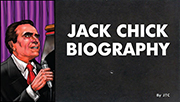
 Introduction ⇑ ⇓
Introduction ⇑ ⇓ 

The little cartoon tracts of Jack Chick can inspire many questions in their readers, but one that often comes to mind is “Why was he like this?”
While there are many people who believe and proclaim extreme forms of fundamentalist Christianity, there aren't quite so many who are willing to truthfully present their most bizarre takes in their writing, much less those with the skills for presenting their views in such an attention-grabbing manner successfully and with a publishing empire that has printed over one billion religious tracts into the world[A]. It is fairly safe to say that Chick was an extreme success in the dissemination of his extreme views.
However, those views didn’t come out of nowhere though. The development of Chick’s beliefs, how they evolved, and how he expressed them can be traced through his work, and through the influences that affected his life. From the firebrand radio preachers of the 1940s to the unhinged conspiracy theorists of the 1970's and 1980's, Chick’s life has always been coloured by the things other people told him that he allowed himself to believe.
Chick has always been a reclusive character, avoiding the spotlight, which has allowed speculation and rumor to almost mythologize his life to an extent. An official biography was published by Chick’s publication company Chick Publications following his death, filling in a lot of gaps, but even there, many of the details presented are incomplete or barely coherent. Put together with what else we know about his life both from the many other people that have spoken of him, and with a little digging of our own, it’s possible to put together a fairly complete picture of just who Jack Chick was, and why indeed he acted the way he did.
 Early Life ⇑ ⇓
Early Life ⇑ ⇓ 
Jack Thomas Chick was no stranger to controversy, and by his own account, one of his first controversial acts was being born. As he puts it, in one of his many open letters:
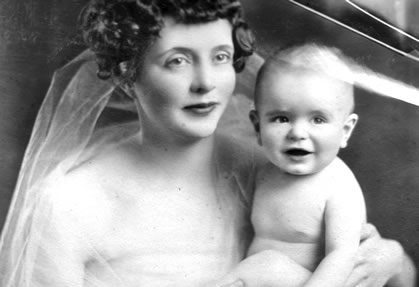
“When I was 40 years old… my mother admitted she had tried to kill me through an abortion. I was stunned! That was ME in there. Where were my rights? In those days the unborn were called babies, not fetuses. I forgave her and let it go.”[B]
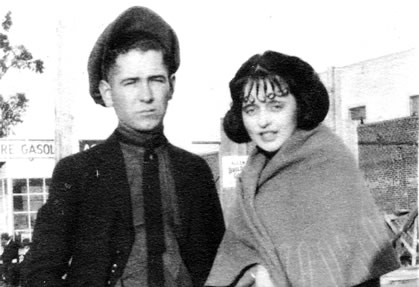
Despite this, Jack Chick made it into the world and was born on April 13, 1924 in Boyle Heights, California to parents Pauline and Thomas Chick. He was a sickly child, and his younger sister Doris, born a few years later, was the favored of the two. His parents were not religious, but his aunts and uncles were Roman Catholic. Considering Chick’s later work, it is unsurprising that he does not speak highly of the Catholics in his early life. [C] (chpt. 10).
Jack Chick enjoyed doodling at an early age and reportedly failed first grade due to drawing airplane dog fights rather than paying attention to the class [D]. By the time he was in Alhambra High School, Chick was by his own account, a notoriously foul-mouthed schoolboy, having picked up some of his family’s habits, which resulted in the Christians at the school shunning him[C] (chpt. 9), figuring “he'd be the last guy on earth to ever accept Jesus” [E].
Chick’s interests in school were drama and public speaking. In 1941, he became a member of the Light and Shadow drama club, serving in the wardrobe department. In his senior year, the drama club changed their name to The Masquers, and in the play performed in his senior year (The American Way), Chick played the character of Karl Gunther, with his school’s yearbook praising his portrayal as “outstanding” [C] (chpt. 8).
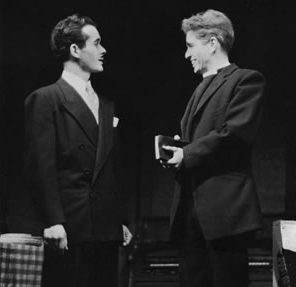
With respect to public speaking, he was a finalist in the Forensic Tournament of the San Gabriel League in March 1942. Competing in the Humorous Declamation Division, Chick was required to deliver a humorous speech. By his own account, his nerves briefly got the better of him and he froze on stage before remembering his line. The judges read it as a dramatic pause that enhanced his performance, and gave him first place, which earned him a two-year scholarship to the Pasadena Playhouse School of Theater - an achievement which Chick in hindsight attributes to divine intervention [E]. His studies were cut short on February 1, 1943, when he was drafted into military service [F], forcing him to exchange the School of Theater for the Pacific Theater.
 Military Service ⇑ ⇓
Military Service ⇑ ⇓
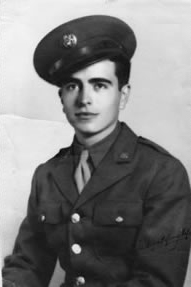
Details on Chick’s military life are a little hazy. He served at the Pacific Theater, seeing New Guinea and Japan, and claims that while he picked up some nasty habits such as smoking and an even more colorful vocabulary, he was still shocked by the behavior of the other men. In his newsletters later in life, Chick would claim to have been at the Battle of Okinawa at the end of World War II [G] (pg. 4), but this directly contradicts his official biography, which states that he served in the cryptography division and never saw combat. On January 28th, 1946, his military contract completed, the now Sergeant Chick was honorably discharged and returned home. [C] (chpt. 9)
 Marriage and Salvation ⇑ ⇓
Marriage and Salvation ⇑ ⇓
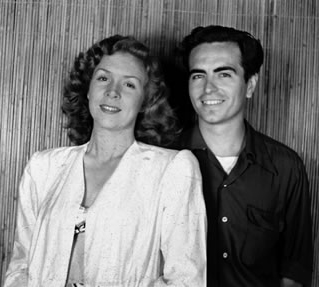
With the war over, and Chick a civilian once again, he picked up where he left off, resuming his studies at the Pasadena Playhouse School of Theater. During this time, he would draw little cartoons of his theater experience, which he called Playhouse Memoirs. [C] (chpt. 7). He would also portray a minister in the Playhouse production “Broken Dishes”. During his studies, Jack made the acquaintance of a Canadian immigrant named Lola Lynn Priddle, who was studying voice and radio work [E]. Lola was a conservative Christian woman from a conservative Christian household, as opposed to Chick, who had no religious upbringing at all. Religious differences didn’t stop the two from falling in love however, and two years later, on March 22, 1948, they were pronounced man and wife.
The newlywed Jack and Lola would spend their honeymoon with Lola’s parents in Canada. Lola’s conservative parents were not impressed at seeing her new son-in-law cursing and smoking like a military man. Lola’s mother Myrtle could only ask “What in the world did you marry?” That Sunday, she urged Chick to listen to Charles E. Fuller’s Old-Fashioned Revival Hour on the radio [C] (chpt. 9). The Old-Fashioned Revival Hour had two parts to it. The first was a half hour of Christian songs, followed by a half hour sermon from Fuller himself. Many of his sermons at the time focused largely on then-current affairs in the Middle East. The state of Israel was less than two months away from declaring independence from Palestine, and Fuller would preach ongoing events there to be a sign of the impending End Times. This had been the topic of his previous week’s sermon, which was the one Chick was tuned in to that day [H]. He was especially affected by the altar call at the end of the sermon, in which Fuller quoted Isaiah 1:18: “Come now… let us reason together… though your sins be as scarlet, they shall be as white as snow (KJV).” Lola had spoken to Chick about Jesus before, but it was that radio broadcast with that verse that got to him. Chick prayed. And so, on a cold Sunday night in Saskatchewan, on March 28, 1948, in the kitchen of his in-laws, Jack T. Chick found Jesus [C] (chpt. 9).
 Early Career ⇑ ⇓
Early Career ⇑ ⇓
After his conversion, Jack Chick wanted to serve as a missionary, but his wife, having heard horror stories from her aunt about a missionary losing his leg to an alligator, talked him out of it. [I]. He also hoped to turn his passion for acting into a career in Hollywood, but after being turned down by a studio, he abandoned that idea too, feeling that his newfound Christian values didn’t mesh well with the behavior he saw in his visit to Los Angeles [C] (chpt. 8). So instead he went to work for his father in the sign-painting business [C] (chpt. 10), while turning his artistic attention to freelance cartoons as a side gig, his work appearing in MacLeans and The American Cartoonist in 1949 [C] (chpt. 7).
In 1952, Chick and his wife's first and only child was born, a daughter they named Carol. Soon after, his wife Lola fell ill and required ongoing care for the remainder of her life.
In 1953, Jack Chick got a job at Aerojet-General Corp., a California-based aerospace company who built rockets and missiles. Chick’s job was to design advertisements to sell Aerojet’s products to the government, and over the decade, this would expand to providing storyboards and animation for training films, and drawing the annual company Christmas card. (in which Fang, a cartoon dog who has since become a Jack Chick calling card, would make its first appearance) [C] (chpt. 9).
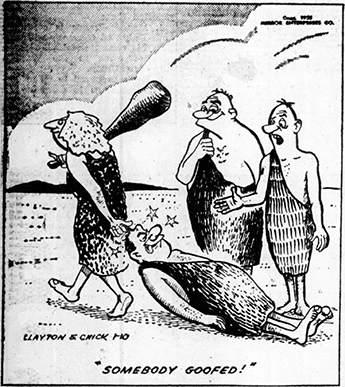
That same year, Chick teamed up with Bill Clayton, to produce the newspaper comic Times Have Changed?, syndicated through the Mirror Enterprises Syndicate of Los Angeles. This comic series saw Clayton & Chick (or Clayton S. Chick as the duo would sometimes be miscredited) satirizing 1950s society as they saw it through the lens of prehistoric cavemen, living alongside dinosaurs (which Chick would later dedicate tracts to claiming people really did do). The cartoon was syndicated across a number of papers including the Clarion Ledger, the Wichita Eagle and the Courier Post. For a time, you could find Jack Chick in the funny pages directly alongside Charles M. Schulz and Walt Kelly. The pressures of a daily newspaper comic combined with still working at Aerospace and trying to care for an ill wife and baby daughter all at once proved too much however, and he felt he and Clayton did not work well together, and so in 1955, with the comic not much more than a year old, Chick quit, breaking his contract with the syndicate [C] (chpt. 9).
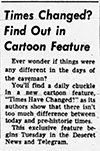
For a time, Chick would attempt a solo career in newspaper comics, and was able to get his editorial comics published in the local paper, but his efforts at syndication for those and other humorous comics failed, which he claims was due to him being blacklisted as a result of breaking his syndication contract [C] (chpt. 10).
Chick felt however that his faith demanded he use his artistic talents to serve God, and so at home on his kitchen table, he would draw sketches, coming up with a compelling narrative depicting what happens to an unbeliever who comes face to face with God [G] (pg. 16). His wife helped by providing relevant Bible verses. As she had been raised in the faith she knew her way around the Good Book better than Jack did [C] (chpt. 12). This would eventually form the basis of the tract This Was Your Life!
In 1960, Jack Chick changed employers to Astro-Science in El Monte. A co-worker gave Chick a copy of “Power from on High” ![]() by Charles Finney, a 19th century preacher who was a central figure in the Second Great Awakening of American Christianity. This got Chick to wonder why he didn’t see that same spirit of Christian revival in his own day, and this inspired him to create his first tract, Why No Revival?, printed in 1961 with an $800 loan from a credit union [J]. In it, Chick draws a series of illustrations, much in the style of his newspaper cartoons, of what he saw as the failings and hypocrisy of modern Christians, even amongst members of his own church, who he drew and used in the tract. Unfortunately for him, said members of his own church would read Why No Revival? and see likenesses of themselves representing everything wrong with Christianity, which did not go down well. [J]. After that, he couldn't really show his face there any more. He had better reception at work though. Astro-Science was owned by a man named George Otis, who much to Chick’s good fortune, was a devout Christian with a similar outlook on his faith as Jack. When he read a copy of Why No Revival? that Chick had given to his secretary, he decided Chick was a “man of God”, and financed his second tract, A Demon’s Nightmare, published in 1962 [G] (pg. 17).
by Charles Finney, a 19th century preacher who was a central figure in the Second Great Awakening of American Christianity. This got Chick to wonder why he didn’t see that same spirit of Christian revival in his own day, and this inspired him to create his first tract, Why No Revival?, printed in 1961 with an $800 loan from a credit union [J]. In it, Chick draws a series of illustrations, much in the style of his newspaper cartoons, of what he saw as the failings and hypocrisy of modern Christians, even amongst members of his own church, who he drew and used in the tract. Unfortunately for him, said members of his own church would read Why No Revival? and see likenesses of themselves representing everything wrong with Christianity, which did not go down well. [J]. After that, he couldn't really show his face there any more. He had better reception at work though. Astro-Science was owned by a man named George Otis, who much to Chick’s good fortune, was a devout Christian with a similar outlook on his faith as Jack. When he read a copy of Why No Revival? that Chick had given to his secretary, he decided Chick was a “man of God”, and financed his second tract, A Demon’s Nightmare, published in 1962 [G] (pg. 17).
Chick experimented with other ways of presenting his message. The ideas he’d begun to form in 1958 became a flip-chart presentation, inspired by his sales pitches at work. He would tour this presentation, which illustrated the fate of a sinner coming face-to-imperceivable-face with God on Judgement Day, around various churches, claiming that one 1963 presentation in a prison chapel led to nine of the eleven inmates in attendance converting there and then. He subsequently adapted this work into what could be considered his most popular tract, This Was Your Life! [C] (chpt. 11). This has since become the most iconic tract of Chick’s ministry, with millions of copies printed in over 120 languages.
In 1966, Jack Chick left Astro-Science, and briefly worked at Lockheed. This would be his last employer. There he met George Collins, who would become his business partner and lifelong friend, setting up his garage as Chick’s new base of operations. [C] (chpt. 11). Prior to this, Chick’s work had been published by Rusthoi Publications [K], who had ascribed the company name "Chick Publications" to Jack Chick’s body of work. Jack took the name with him and became independent. He and Collins quit Lockheed, and focused full-time on manufacturing weapons for The Lord.
 Chick Publications ⇑ ⇓
Chick Publications ⇑ ⇓
Chick Publications quickly outgrew Collins’ garage, and was finally relocated to a strip mall in Rancho, Cucamonga [I], where it remains to this day. With tract publishing now his day-job, Chick would settle on a universal format for the tracts, which did not previously have a consistent size or length, after being advised to do so by his printer at the time, John Boewe. This made them easy and cheap to mass produce. Officially, Chick would claim to have been inspired by propaganda tracts published in Communist China [C] (chpt. 11), but it has also been speculated that he may have drawn influence from Tijuana Bibles - small pornographic comics that were commonplace in Jack’s younger, pre-Christian days [L].
With a proper publishing setup in place, Chick grew increasingly ambitious with his stories and "research". In early 1971 he went so far as to write J. Edgar Hoover ![]() , director of the FBI, asking for his assistance in writing the tract that would become The Poor Revolutionist, enclosing copies of anti-witchcraft tract Bewitched and anti-evolution tract Big Daddy as examples of his work. Neither tract was particularly compelling to the FBI and they wrote back turning down a collaboration.
, director of the FBI, asking for his assistance in writing the tract that would become The Poor Revolutionist, enclosing copies of anti-witchcraft tract Bewitched and anti-evolution tract Big Daddy as examples of his work. Neither tract was particularly compelling to the FBI and they wrote back turning down a collaboration.
In early November 1971, Chick’s father, Thomas Chick, died. Chick was present at his deathbed, and urged him to believe in Jesus in his final moments, pleading “I’m going to pray aloud, and if you want to receive Jesus… please squeeze my hand.” His father squeezed Chick’s hand twice, and thus he believed his father had been saved [C] (chpt. 10). Chick would channel this story into his tract Born Wild! in 2012.
Chick’s publishing empire would continue to expand, and 1972 alone would see Chick turning out more than ten new tracts. Their prevalence would attract interest not just from churches and missionaries, but also fans of underground comics and people who enjoyed their outlandish content ironically. Their simple format would see both imitators, such as the Life Messengers series, and parodies such as Head Shop or Dead Shop, which appeared in a National Lampoon issue dedicated to spoofing religious media [M].
The speed at which he was producing new titles was helped by the hiring of a second artist, Fred Carter [N], a former art school student. In contrast to Chick’s cartoonist background, Carter brought a much more comic-book sensibility to the output of Chick Publications, including a more realistic and dynamic art style in many tracts, and indeed, actual full-sized comics, the Crusaders Series. The first of these, 1974’s Operation Bucharest, was a Cold War spy thriller with the twist of the smuggled intel being the gospel message. As time went on, the Crusaders Series is where Chick would publish some of his most controversial work.
 The Conspiracists ⇑ ⇓
The Conspiracists ⇑ ⇓
Jack Chick was a dyed-in-the-wool conservative Christian ever since his conversion in 1948, and this was always reflected by work such as his depiction of gay and lesbian characters in The Gay Blade, and leftist revolutionaries in The Poor Revolutionist. What greatly molded his world view however, was a succession of self-proclaimed ‘experts’, whose wide running conspiracies would find their way into many of the tracts and comics.
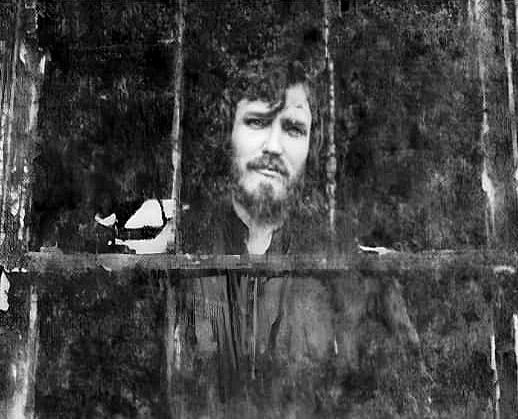
In 1973, Chick met a man through Doug Clark, host of the Faith Broadcasting Network’s “Amazing Prophecies.” This would be a man who would radically shift the direction of his publications. He had gone by many names, but Chick knew him as John Todd.
Todd claimed to have been raised in a family of witches, and that he had become a High Druid as part of the Illuminati, before being saved by, among other things, reading a Chick Tract. Todd would tell Chick stories of Satanists performing ritual sacrifices, infiltrating churches, controlling the world through The Illuminati, and committing acts of cannibalism. Chick would adapt his theories into comics in the Crusaders series, beginning with volume 2, The Broken Cross. As well as adopting Todd’s theories, Chick also adopted his paranoia. Following an interview on Christian TV in which he was asked some difficult questions about the content of The Broken Cross, Chick became convinced that the world of Christian showbusiness was actively plotting against him, and would decline all interviews for the rest of his life. [C] (chpt. 1)
This would go on for some time, with Todd feeding Chick information about the evil forces behind Rock Music, Dungeons & Dragons, and the works of fantasy authors Tolkien and C.S. Lewis, which Chick would repeat in various comics and tracts, including Spellbound, Angels?, and perhaps most famously, Dark Dungeons [O].
Todd’s reputation would be shattered by a number of exposés denouncing him as a fraud [P], and eventually Todd would be convicted of rape [Q] living out the rest of his life in prison, followed by a mental institution, until his death in 2007. Despite this, Chick would stand by his work with Todd, and the comics informed by his theories remain in print today.
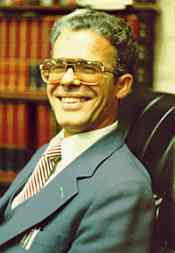
In the late 70's, Chick met the man who arguably had the greatest impact on his life’s work. He was approached by a man named Alberto Rivera, who was searching for a publisher to tell his story. He claimed to be a former Jesuit, on the run from the Catholic Church for deserting them with knowledge of their most terrible secrets. He told how he had been tasked with undermining Protestantism by burying pastors in scandal. He told of his death-defying escape from a secret Barcelona prison for insane priests. He told stories of how the Catholic Church created Islam, the Communist and Nazi parties, going so far as to declare the Catholic Church to be the Whore of Babylon prophesied in the Book of Revelation. After asking his closest friends, including God, whether or not he should “hit the Whore” [C] (chpt. 6), Chick chose to tell Alberto’s story in the way he knew best, as part of the Crusaders comic series, the first of which, simply titled Alberto, was published in 1979.
Reaction to Alberto was unsurprisingly strong. Many Christian bookstores refused to stock it, (G, pg 6), Chick was forced out of the Christian Booksellers Association [R],
and by 1981, an investigation by Gary Metz of Christianity Today had examined and dismissed Alberto’s claims as fraudulent [S].
Where most would see this as a normal response to a comic full of inflammatory and dubious claims, Chick saw different. To him, the backlash simply proved that the shadowy Vatican conspiracy that he had written about had now turned its sights on him ![]() . His paranoia grew such that he would openly accuse Billy Graham of being in on the Catholic conspiracy against him because Graham had founded Christianity Today, the magazine that had become his harshest critic [T]. He would spend the rest of his life fearing assassination by Jesuit agents.
. His paranoia grew such that he would openly accuse Billy Graham of being in on the Catholic conspiracy against him because Graham had founded Christianity Today, the magazine that had become his harshest critic [T]. He would spend the rest of his life fearing assassination by Jesuit agents.
His faith in Rivera’s story remained steadfast however, and he would ultimately publish five more Crusader comics detailing Alberto’s supposed life story and increasingly inflammatory claims. His tract output would also change focus. Out of the 45 tracts published by Chick in the 1980s, more than a third would be based on Rivera’s claims, or depict Catholics as villains.
Rivera’s influence didn’t just change the future of Chick Publications, but also its past. Chick would go on to rewrite many of his old tracts to match his current worldview. Pages of The Beast would be redrawn to depict the Pope as one of the horsemen of the apocalypse. The new-age cultists of The Last Generation would be rewritten to show fealty to “The Queen of Heaven”. Even Why No Revival? would receive a rewrite, accusing Christian television of compromising its values by having Catholic bishops as guests.
Both Rivera and Todd were ardent believers that the King James version of the Bible was the only valid translation. Chick had always favored citing the KJV in his tracts, deviating only on rare occasions when the wording of other translations suited him better, but during his time working with Todd and Rivera, he became an ardent advocate for King James exclusivity, publishing many tracts and comics decrying all other translations as “satanic counterfeits.”
Chick has worked with, published, or supported a number of other conspiracists over the years, all of whom influenced his own work in some way.

There was Rebecca Brown, also known as Ruth Eileen Bailey, a former M.D. who like John Todd claimed to have been involved with Satanic cults before switching sides and using her supposed experience to save people from demons and write books ![]() about it. She informed some of Chick’s anti-witchcraft tracts - like The Poor Little Witch - in the mid-1980s before being exposed as a fraud whose medical license had been revoked. [U]
about it. She informed some of Chick’s anti-witchcraft tracts - like The Poor Little Witch - in the mid-1980s before being exposed as a fraud whose medical license had been revoked. [U]

Next was William Schnoebelen, who claimed to be a 90th degree Mason, a first degree member of the Illuminati, a second degree warlock, a Catholic bishop, a vampire with an insatiable thirst for human blood, and a worshiper of “the Great Old Ones.” [V] Chick would cite Schnoebelen’s writings (which Chick Publications would also publish) in various tracts, mostly those relating to Halloween and the Occult, but in recent years Chick Publications seem to have distanced themselves from Schnoebelen and no longer stock his books.

Last and not least, there was Kent Hovind, who spun creationist apologetics which Chick would use in his new and revised creationist tracts in the early 2000s. Hovind was eventually convicted of tax fraud and imprisoned in 2007 [W]. Following the erosion of his reputation, even amongst other creationists, newer versions of these tracts are printed without reference to Hovind.
Chick would incorporate ideas from all these people into his tracts, making them even more of an absolute mishmash of questionable theology and wild conspiracy theories.
 Losses and Health Scares ⇑ ⇓
Losses and Health Scares ⇑ ⇓ 
In 1987, Chick published a series of comics written and drawn by Mary Mitchell. They were geared towards a much younger audience and featured children engaged in spiritual warfare. These did not prove a success and today, The Overcomers are some of the rarest comics in the Chick Publications library.
In 1991, Chick’s mother, Pauline, died. She and Jack were never close, and she had never supported her son's efforts. [C] (chpt. 10)
For much of the 90's, Chick had Carter working on a feature-length video project, so Chick did most of the tracts himself. 1995 saw the debut of Chick Publications’ online presence, with the publisher snapping up "chick.com", through which they would not only sell tracts, but also display them online in full. This greatly expanded their audience, both of eager believers ready to distribute more tracts, and to a whole new audience of baffled netizens, being introduced to the oddities of Chick’s world for the first time.
Table 1: Chick.com Website Snapshots| Evolution of the Chick.com Website | |||||
|---|---|---|---|---|---|
| Dec. 9, 1996 | Apr. 18, 1999 | Apr. 04, 2001 | Feb. 10, 2004 | Nov. 28, 2006 | Jan. 30, 2009 |
 |
 |
 |
 |
 |
 |
| Sep. 09, 2012 | Oct. 26, 2016 | Nov 03, 2018 | Mar. 29, 2020 | Nov. 24, 2023 | |
 |
 |
 |
 |
 |
|
In 1996, Chick suffered a stroke, which he attributed to Satan attempting to stop him from drawing Where’s Rabbi Waxman?, which he had just completed.
“I laughed to myself all the way to the hospital,” Chick would go on to say, “and told Satan, ‘You lost this battle, Satan. Waxman has already been drawn. This hand will be normal again and serve the Lord.’”[G] (pg. 5)
While Chick was quickly back at work following this event, many followers of his work consider this to be the point where the quality of his artwork begins to noticeably decline.
In 1997, Alberto Rivera died following a battle with colon cancer. Chick would maintain that his friend had been murdered by Catholic agents in an attempt to silence him, and for a time released the comics telling his story for free online.
Tragedy would continue to strike the Chick family in the following years. According to Jack’s official bio, Jack’s daughter Carol got into Witchcraft, and then went through a number of unhappy relationships, one of which ended with her having an abortion, and another with her addicted to drugs and in a wheelchair. Whatever happened, she ended up hospitalized with a severe illness from which she never fully recovered, dying in 2001 [C] (chpt. 10). During this time, having never recovered from her own long-term illness, Chick’s first wife Lola died in 1998 from a massive coronary blood clot [E]. Chick would remarry shortly afterwards [I] to a woman forty years his junior named Kiem Hwa, who adopted the American name “Susy”, and which Chick would immortalize in the short-lived “Lil’ Susy” tract series in 2003 and 2004.
 Later Life and Death ⇑ ⇓
Later Life and Death ⇑ ⇓ 
For Chick himself, the work continued. In 2000, he took on David W. Daniels, a man who specialized in Bible Version conspiracy theories, as a researcher, and ultimately a co-writer and protégé. Together, they would write the Bible Tract series, 25 tracts that would tell a continuous story, highlighting what Chick considered to be the most important Bible stories and how he felt they tied in to what he considered to be the most important issues of the time. Touching on such varied topics as LGBT Pride, Harry Potter, September 11th, and of course, Catholicism, these tracts in particular serve as a crash course on Chick’s view of the world.
This would culminate in 2003’s release of the feature-length video, The Light Of The World. Illustrated with over 360 paintings by Fred Carter, who had spent the last fifteen years working on them [X]. This 78-minute narrated slideshow would showcase Chick’s version of the Gospel message, with particular emphasis on depicting the crucifixion of Jesus in as graphic a manner as possible. This was Chick’s passion project (no pun intended), with plans to use the film in missionary work, translated into over a thousand languages. As of 2023, it is currently available in 23 languages.
Meanwhile, the work continued. He kept a poster in his home of Carter’s depiction of hell, simply captioned “151,000 died today.” The way Chick saw it, as long as people were still dying and going to hell, it was up to him to keep writing tract after tract after tract after tract in an attempt to reach them. [C] (chpt. 13)
Undaunted by health scares, including a diabetic coma and a heart attack requiring triple bypass surgery [Y], Chick would continue to turn out tracts at the pace of one every two months. “Even though everything hurts, we’ve still got one job to be done—trying to win souls for our Master.” he wrote in a 2014 newsletter. “I can't retire! We are at war, beloved.” [Z]
After 55 years of writing tracts, Jack T. Chick died in his sleep on October 23, 2016, at the age of 92. He is survived by his widow, and Chick Publications is now run by Jack’s successor and official biographer David W. Daniels.
 Conclusion ⇑ ⇓
Conclusion ⇑ ⇓
Jack Chick may have never seen combat in the Pacific, but it's clear that he considered himself as a man at constant war, both in a spiritual sense in the battle for souls, and in a literal sense, against demon-possessed witches, militant homosexuals, and the shadowy forces of the Vatican. Both Chick’s published works, as well as his personal messages and correspondence, are rife with military and war-time imagery. He called his own office at Chick Publications “The War Room”[G] (pg. 25). “The war” was something that drove him all the way to his death.
Beyond that though, the question of “Who is Jack Chick” is made difficult to answer by how much of who Jack Chick is was defined by other people. His openness to collaborating with conspiracy theorists led to him absorbing their stories fully into his own theology. Even his faith in Christianity itself is very much defined by his sudden immersion in conservative Christian culture through his marriage to Lola Lynn.
What is indisputable, however, is the legacy he has left behind. A few years after Chick’s passing, Chick Publications announced the publication of their billionth tract. Amongst those billion tracts (some of which are messages about "The Gospel") are hundreds of thousands, perhaps millions, presenting Evolution and Climate Change as hoaxes to brainwash the world. In addition, he presents LGBTQ+ people as militant pedophiles, the Catholic church as the Whore of Babylon, and the Israeli state as God-ordained, but the Jewish people themselves as hell-bound if they don’t convert to Christianity. The Southern Poverty Law Center lists Chick Publications as an active hate group and it’s not difficult to see why. It’s a dark and frightening world Jack Chick presents, and from their sales figures, plenty of people are willing to buy into that world.
All this stemmed from a single radio broadcast bringing on his “salvation”, and ultimately his radicalization. With the hundreds of millions of his self-published tracts in circulation, we may never truly know the extent of how many people he has influenced and radicalized in turn.
 Further Reading ⇑ ⇓
Further Reading ⇑ ⇓ 
- Who Was Jack Chick? - Biography at Chick Publications website.
- You Don't Know Jack [Youtube] - Playlist of videos produced by David Daniels and Chick Publications detailing Chick's life and influence.
- Cartooning For Christ - by Michael Colton (1999), Originally from Brill’s Content. Retrieved via Medium.com.
- Chick Tracts, Monstrosity, and Pornography - by Anastasia Ulanowicz (2015), ImageTexT Web Journal published by the Department of English - University of Florida.
- God's Cartoonist: The Comic Crusade Of Jack T. Chick (2008) [Video] - Documentary film produced by Kurt Kursteiner of the Jack Chick Museum of Fine Art (via Archive.org).
- Jack T. Chick Biography - Biography at Lambiek Comiclopedia.
- The MOST Evil Comic Strip Artist of All Time [Youtube] - A video by user Snedwich discussing the more unsavory aspects of Chick's work.
- Listing of "General Hate Groups" - Classification of Chick Publications as a "General Hate Group" by the Southern Poverty Law Center.
- "Pastor Apologizes For Hate-filled Halloween Hand-out" (2011) - by Leah Nelson. Article describing an incident where an Ohio church recieved negative publicity for distributing the tract Mean Momma during Halloween (via the Southern Poverty Law Center).
- Satan, The Pope, and Dungeons & Dragons: How Jack Chick's cartoons informed American fundamentalism - by Alissa Wilkinson (2016), Vox Magazine.
- The Strange Legacy of Jack Chick [Youtube] - A general discussion by Seth Andrews of The Thinking Athiest of Chick's life, works, more infamous tracts, and his enduring legacy on Christian media.
- The Tragic Life Cycle of the Chick Tract Evangelism Campaign - by Captain Cassidy (2024), OnlySky Media.
- Who was Jack Chick? [Youtube] - A video by How Stuff Works discussing the phenomenon of Chick tracts on the popular zeitgeist.
 References ⇑
References ⇑
- #[A] ⇑ One Billion Chick Tracts. Chick Publications website. [Retrieved November 13, 2023]
(https://www.chick.com/information/article?id=one-billion-chick-tracts) - #[B] ⇑ A Message from Jack Chick Battle Cry July/August 2000 (Archived). [Retrieved November 13, 2023]
(https://web.archive.org/web/20000823221018/http://www.chick.com/bc/2000/jtcletter.asp) - #[C] ⇑ You Don't Know Jack. by David W. Daniels (2017). Chick Publications.
(https://www.chick.com/products/item?stk=1443) - #[D] ⇑ God's Cartoonist - Jack Thomas Chick. Chick Publications website.
(https://www.chick.com/authors/jack-chick ) - #[E] ⇑ A Message from Jack Chick Battle Cry March, 1998 (Archived).
(https://www.chick.com/battle-cry/article?id=a-message-from-jack-chick-03-1998) - #[F] ⇑ World War II Army Enlistment Records - Chick, Jack T. The National Archives.
(https://aad.archives.gov/aad/record-detail.jsp?…) - #[G] ⇑ The Imp, Number 2 by Daniel K. Raeburn (1998). Imp Publications.
(http://danielraeburn.com/uploads/6/1/3/6/61362967/imp_jtc.pdf)
- #[H] ⇑ Perilous Times - 2 Timothy 3:1-5. by Charles Fuller (March 21, 1948). Charles Fuller and the Old Fashioned Revival Hour via the David Allen Hubbard Library Digital Archives.
(https://cdm16677.contentdm.oclc.org/digital/collection/p16677coll1/id/80/rec/65) - #[I] ⇑ Cartoonist Jack Chick Has Died, Leaving Behind a Lifetime of Evangelical Comics That Fascinated a Generation by Robert Ito, Los Angeles Magazine.
(https://lamag.com/art/cartoonist-jack-chick-died-leaving-behind-lifetime-evangelical-comics-fascinated-generation) - #[J] ⇑ Interview with Jack Chick: How Chick Ministry Began. Battle Cry July/August 1984.
(https://www.chick.com/battle-cry/article?id=Interview-with-Jack-Chick-How-Chick-Ministry-Began) - #[K] ⇑ The Ralph Rusthoi Connection by Troy Davis. The Museum of Weird and Demented Religious Tracts.
(https://weirdtracts.blogspot.com/2019/01/the-ralph-rusthoi-connection.html) - #[L] ⇑ Two Centuries of Underground Comic Books by Daniel K. Raeburn (1998). Printed in "Strips, Toons, and Bluesies: Essays in Comics and Culture", edited by D. B. Dowd & M. Todd Hignite (2006).
(https://books.google.com/books/about/Strips_Toons_and_Bluesies.html?id=TjzlxyfWbxwC) - #[M] ⇑ National Lampoon. Issue December 1974 Vol I, No. 57
(https://www.marksverylarge.com/issue-index/1974-12/) - #[N] ⇑ Died: Fred Carter, Little-Known Black Artist Behind Chick Tracts by Daniel Silliman. Christianity Today, May 20, 2022.
(https://www.christianitytoday.com/news/2022/may/fred-carter-chick-tract-gospel-art-evangelism-cartoons.html) - #[O] ⇑ Secrets of Dark Dungeonsby P.D. Magnus. Fecundity.com.
(https://www.fecundity.com/pmagnus/darkdung.html) - #[P] ⇑ The Legend(s) of John Todd by Daniel E. Plowman, Christianity Today, Feburary 2 1979.
(https://www.christianitytoday.com/ct/1979/february-2/legends-of-john-todd.html)
- #[Q] ⇑ Man gets 30 years for rape by Debra-Lynn B. Hook (January 23, 1988). The State.
(https://www.newspapers.com/article/the-state-man-gets-30-years-for-rape/91516980/) - #[R] ⇑ Booksellers Group May Expel Chick. Christianity Today, October 23, 1981.
(https://www.christianitytoday.com/ct/1981/october-23/booksellers-group-may-expel-chick.html)
- #[S] ⇑ Jack Chick’s Anti-Catholic Alberto Comic Book is Exposed as a Fraud by Gary Metz, Christianity Today, March 13, 1981.
(https://www.christianitytoday.com/ct/1981/march-13/jack-chicks-anti-catholic-alberto-comic-book-is-exposed-as.html)
- #[T] ⇑ A Message From Jack Chick About Alberto Rivera. Battle Cry, March/April 2006.
(https://www.chick.com/battle-cry/article?id=a-message-from-jack-chick-03-2006) - #[U] ⇑ The Bizarre Case of Doctor Rebecca Brown by John Baskette (1994). Originally posted to USENET in soc.religion.christian (via Archive.today).
(https://archive.ph/G6VGq) - #[V] ⇑ Lucifer Dethroned by William Schnoebelen (1993). Chick Publications.
(https://www.amazon.com/Lucifer-Dethroned-Story-William-Schnoebelen/dp/0937958417) - #[W] ⇑ The Trials of Kent Hovind by Peter J. Reilly, Forbes Magazine, May 2015.
(https://www.forbes.com/sites/peterjreilly/2015/05/05/the-trials-of-kent-hovind-an-american-tragedy/) - #[X] ⇑ Meet Jack Chick. by Jimmy Akin (2004). JimmyAkin.com
(https://jimmyakin.com/2016/10/meet-jack-chick.html) - #[Y] ⇑ A Message from Jack Chick. Battle Cry, September/October 2005.
(https://www.chick.com/battle-cry/article?id=A-Message-From-Jack-Chick-09-2005) - #[Z] ⇑ A Message from Jack Chick. Battle Cry, November/December 2014.
(https://www.chick.com/battle-cry/article?id=Message-From-Jack-Chick-November-December-2014)
